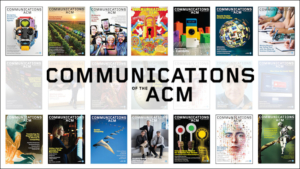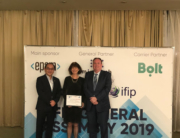“Communications of the ACM” Relaunched as Web-First Publication
 ACM has relaunched Communications of the ACM (CACM), the organization’s flagship magazine, as a web-first publication. The web-first model allows CACM to publish articles more rapidly than before so that readers can keep abreast of the lightning-fast changes in the computing field. At the same time, researchers can reference and cite valuable information and research from CACM articles more quickly. The reengineered website also allows CACM authors to publish longer articles and make greater use of video and other multimedia content. And the CACM website is even more user-friendly with improved search capabilities, more interactivity, simplified categorization of articles in new sections, daily content updates and a modern, spacious design that lends itself to all devices.
ACM has relaunched Communications of the ACM (CACM), the organization’s flagship magazine, as a web-first publication. The web-first model allows CACM to publish articles more rapidly than before so that readers can keep abreast of the lightning-fast changes in the computing field. At the same time, researchers can reference and cite valuable information and research from CACM articles more quickly. The reengineered website also allows CACM authors to publish longer articles and make greater use of video and other multimedia content. And the CACM website is even more user-friendly with improved search capabilities, more interactivity, simplified categorization of articles in new sections, daily content updates and a modern, spacious design that lends itself to all devices.
“CACM offers readers access to this generation’s most significant leaders and innovators in computing and information technology,” explained ACM President Yannis Ioannidis. “It also provides a critical outlet for researchers and practitioners to showcase their work. We believe the entire global computing community will benefit enormously by using CACM as a forum for presenting and discussing the most significant new ideas and results. We also believe that CACM’s web-first, open platform will showcase once again the leadership position of ACM in advancing the art, science, engineering, and application of computing by fostering the open exchange of information and inspiring many more computing professionals to engage with and benefit from the rich spectrum of ACM activities.”
Featured ACM Member: Deirdre Mulligan
 Deirdre K. Mulligan serves as Principal Deputy U.S. Chief Technology Officer in the White House’s Office of Science and Technology Policy (OSTP). OSTP works to maximize the benefits of science and technology to advance health, prosperity, security, environmental quality, and equity for all Americans. OSTP advises the President and White House senior staff on key issues related to science and technology and coordinates Federal government technology policy and priorities.
Deirdre K. Mulligan serves as Principal Deputy U.S. Chief Technology Officer in the White House’s Office of Science and Technology Policy (OSTP). OSTP works to maximize the benefits of science and technology to advance health, prosperity, security, environmental quality, and equity for all Americans. OSTP advises the President and White House senior staff on key issues related to science and technology and coordinates Federal government technology policy and priorities.
On leave while at OSTP, Mulligan is also a Professor at the School of Information at UC Berkeley and a Faculty Director of the Berkeley Center for Law & Technology. Her research focuses on protecting values including privacy, equity, and freedom of expression in sociotechnical systems. In her interview, she discusses her role as Deputy U.S. Technology Officer, the responsibilities of OSTP, emerging challenges in information technology law, and more.
Read Mulligan’s interview here.
Featured ACM Member: Elaine Shi
 Elaine Runting Shi is an Associate Professor at Carnegie Mellon University, where she is part of CyLab, CMU’s Security and Privacy Institute. Her research interests include cryptography, game theory, algorithms, and the foundations of blockchains. She is part of a small group of people whose work spans systems and theory.
Elaine Runting Shi is an Associate Professor at Carnegie Mellon University, where she is part of CyLab, CMU’s Security and Privacy Institute. Her research interests include cryptography, game theory, algorithms, and the foundations of blockchains. She is part of a small group of people whose work spans systems and theory.
Her textbook, Foundations of Distributed Consensus and Blockchains, is available for download. Shi was named an ACM Fellow for contributions to the scientific foundation of oblivious computation and decentralized blockchains. In her interview, she discusses emerging challenges in information technology law, the role of government in technology, and more.
ACM ByteCast: Edward Y. Chang
 In this episode of ACM ByteCast, Rashmi Mohan hosts 2021 ACM Fellow Edward Y. Chang, an Adjunct Professor in the Department of Computer Science at Stanford University. He is the Founder and CTO of Ally.ai, an organization making groundbreaking moves in the field using Generative AI technologies in various applications, most notably healthcare, sales planning, and corporate finance.
In this episode of ACM ByteCast, Rashmi Mohan hosts 2021 ACM Fellow Edward Y. Chang, an Adjunct Professor in the Department of Computer Science at Stanford University. He is the Founder and CTO of Ally.ai, an organization making groundbreaking moves in the field using Generative AI technologies in various applications, most notably healthcare, sales planning, and corporate finance.
Chang discusses his career, from studying Operations Research at UC Berkeley to graduate work at Stanford University, where his classmates included the co-founders of Google and where his PhD dissertation focused on a video streaming network that became DVR. He also shares his work at HTC in Taipei, which focused on healthcare projects, as well as his current interest, studying AI and consciousness. He talks about the challenges he’s currently facing in developing bleeding edge technologies at Ally.ai, addresses a fundamental question about the role of humans in a future AI landscape, and more.
ACM TechTalk: Jan Bosch
 “Software Product Management: From Opinions to Data-Driven Experimentation,” presented on Wednesday, April 3 at 12:00 pm ET/4:00 pm UTC by Jan Bosch, a Professor at Chalmers University.
“Software Product Management: From Opinions to Data-Driven Experimentation,” presented on Wednesday, April 3 at 12:00 pm ET/4:00 pm UTC by Jan Bosch, a Professor at Chalmers University.
Product management is a notoriously difficult role as it straddles the business and R&D side of the company and involves aligning a significant number of stakeholders around the prioritization of the work. Traditionally, most product management activities were conducted in a qualitative fashion, relying on the opinions of customers, stakeholders, and the product managers. With the emergence of fast feedback loops with products in the field due to DevOps, the large amounts of data available and the role of AI, we can evolve product management activities to be much more focused on data driven decision making and experimentation. Bosch presents the trends underlying the changes in product management, the practices that allow us to exploit these trends, and the resultant increase in effectiveness of R&D when applying these practices.





